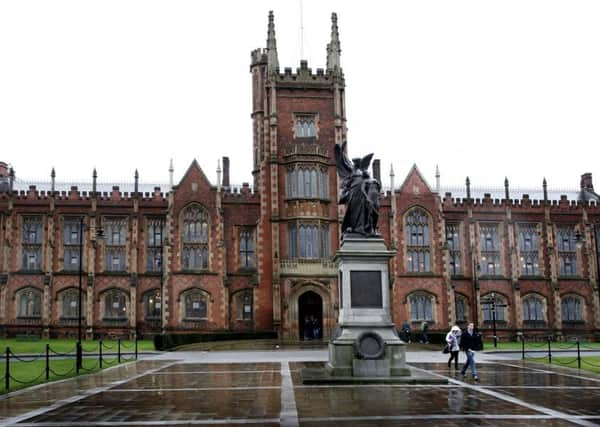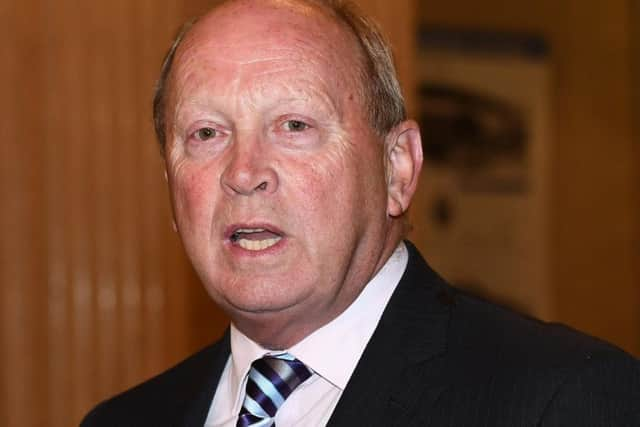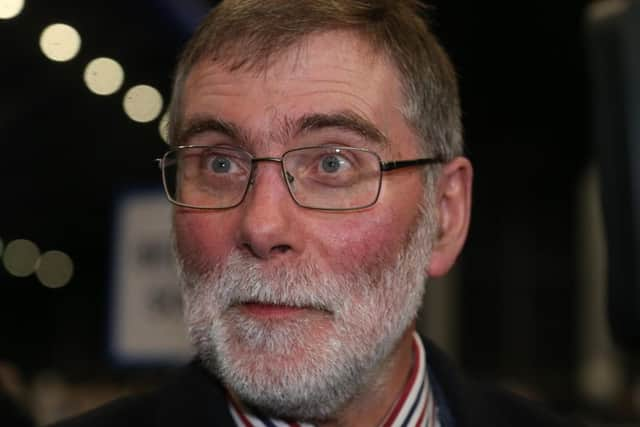Criticism of academics will continue vow unionist pair


Both Jim Allister and Nelson McCausland spoke out after the University College Union (UCU) voiced concern at the “wholly unfair and worryingly authoritarian attacks on local academics’ right to voice free opinions”.
The pair denied attacking opinions, but said they were defending less common opinions. The row began last year when 37 Queen’s lecturers objected to an honorary professorship for Peter Robinson.
Advertisement
Hide AdAdvertisement
Hide AdMr Allister and McCausland have since challenged perceived academic imbalance.


In a statement, the UCU, which represents lecturers at Queen’s, said complaints made by TUV leader Mr Allister and ex DUP MLA Mr McCausland, were an “outrageous attack on democracy and the values of free speech that our society holds dear.”
The UCU said: “In March last year, Jim Allister wrote to Queen’s expressing ‘strong disquiet’ after one of its professors questioned the over-representation of particularly entrenched views on local political issues on BBC Radio Ulster. Mr McCausland has repeatedly complained about what he characterises as the ‘left-wing sympathies’ of academics in Queen’s and University of Ulster.
Colleagues have been named and denounced as a danger for the future of the region. Politicians who express such views are playing a dangerous game.”
Advertisement
Hide AdAdvertisement
Hide AdBoth Mr Allister and McCausland asked UFU to reflect on why it can condemn a perceived challenge to its freedom of expression, but has no comment to make on those who permanently silenced lecturer Edgar Graham, the Ulster Unionist politician shot dead at Queen’s by the IRA in 1983.


Responding to the UCU statement, Mr Allister called on the UCU to condemn the Graham murder and added: “Academics publish their views to encourage debate, so why should they respond so defensively when their views encourage that debate?”
Mr McCausland said that while academics objected to the Robinson professorship, they “said nothing” when “a QUB lecturer stood as a Sinn Fein election candidate and declined to condemn the murder of Edgar Graham”.
Mr Allister said: “People, academics or not, who sign a public letter have already given permission de facto for their names to be circulated be the subject of debate.
Advertisement
Hide AdAdvertisement
Hide Ad“The UCU defence of academic freedom would be more convincing if it threw its weight behind the commemoration of Edgar Graham, a law lecturer who was very effectively silenced when he was murdered by the IRA on campus for airing unpopular opinions.”
The TUV leader added: “Having raised the issue would the UCU like to take the opportunity to clearly condemn the murder of Edgar Graham?”
Mr McCausland said it was “worth recalling that 37 QUB academics signed a letter of objection” when the university offered an honorary professorship to Peter Robinson.
“However when a QUB lecturer stood as a Sinn Fein election candidate and declined to condemn the murder of Edgar Graham, they said nothing.”
Advertisement
Hide AdAdvertisement
Hide AdMr McCausland said that holding an academic post “does not provide anyone with infallibility”.
“Independent research has shown that across the UK, the USA and much of western Europe there is a political imbalance within universities, with 80% of academics holding left of centre views and only 20% holding right of centre views.
“Moreover that 80% can range from Labour to Marxists, Trotskyists and even Sinn Fein.
“Academics are able to express a viewpoint but equally others are free to critique their views. When a QUB professor tweets that ‘hell is too good’ for the promoters of Brexit, I would argue that politicians and others have the right to call out such a divisive statement.”
Advertisement
Hide AdAdvertisement
Hide AdMr McCausland, a former Minister for Culture at Stormont, went on to say: “I hope that this leads to an open debate about our universities and academics.
“Universities are powerful institutions in that they influence and shape society, just as politics shapes and influences society. It is right therefore that universities and academics are held to account.”
Also speaking to the News Letter, Queen’s branch president of the UCU, Dr Merav Amir, said her union was “all for lively debate,” but objected when complaints are made to university bosses.
“Debates such as these are important for flushing out issues of social concern for society at large, and are very important for the democratic make up of society.
Advertisement
Hide AdAdvertisement
Hide Ad“What we are concerned with are not so much the responses to such statements. What we are concerned with is the way in which the university has been approached to limit the ability of the staff to speak publicly,” Dr Amir said.
“It’s the attempt to threaten either livelihoods, or freedom of expression, through some of these interventions that concerns us.
“I don’t think [we] are trying to stifle debate – quite the contrary – we like debate.”
Commenting specifically on the challenge to condemn the murder of Edgar Graham, Dr Amir said: “I am quite opposed to this kind of politics...trying to get people to condemn acts of violence.
Advertisement
Hide AdAdvertisement
Hide Ad“It is trying to create hierarchies of grief or sorrow or pain, and I don’t think this is useful in any way.”
She also said the “outrage” at the honorary professorship for former DUP leader Peter Robinson in 2018 was a response to a perception that he had backed “homophobic and Islamophobic” statements.
“It’s more about questions relating to equality and inclusion and diversity,” Dr Amir added.
A spokeswoman for the university said: “Over the last year, Queen’s University has received two complaints from politicians regarding comments made by academics.
“Queen’s supports freedom of thought and expression, within a framework of respect for the rights of other persons.”